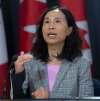Economic uncertainty makes for unpredictable budgeting Giving in to panic worst thing province could do
Read this article for free:
or
Already have an account? Log in here »
To continue reading, please subscribe:
Monthly Digital Subscription
$0 for the first 4 weeks*
- Enjoy unlimited reading on winnipegfreepress.com
- Read the E-Edition, our digital replica newspaper
- Access News Break, our award-winning app
- Play interactive puzzles
*No charge for 4 weeks then price increases to the regular rate of $19.00 plus GST every four weeks. Offer available to new and qualified returning subscribers only. Cancel any time.
Monthly Digital Subscription
$4.75/week*
- Enjoy unlimited reading on winnipegfreepress.com
- Read the E-Edition, our digital replica newspaper
- Access News Break, our award-winning app
- Play interactive puzzles
*Billed as $19 plus GST every four weeks. Cancel any time.
To continue reading, please subscribe:
Add Free Press access to your Brandon Sun subscription for only an additional
$1 for the first 4 weeks*
*Your next subscription payment will increase by $1.00 and you will be charged $16.99 plus GST for four weeks. After four weeks, your payment will increase to $23.99 plus GST every four weeks.
Read unlimited articles for free today:
or
Already have an account? Log in here »
Hey there, time traveller!
This article was published 09/03/2020 (2106 days ago), so information in it may no longer be current.
There are few things more unnerving for government officials in the days leading up to a budget than massive swings in the global economy — the kind we’ve seen in recent days. But when the Pallister government introduces its 2020 budget Wednesday, it will likely look beyond the short-term effects of a global downturn and focus on Manitoba’s long-term outlook.
It doesn’t have much choice.
Budget-making is a difficult task at the best of times. Projecting tax and other revenues is more of an art than a science; estimates are based on economic growth projections that are rarely accurate. Business decisions on when to declare income can also result in unexpected declines (or increases) in corporate tax revenues. Even surprise decisions by Crown corporations, like when to divest assets, can have a significant effect on the bottom line.
However, the economic uncertainty and panic now being felt around the world from the novel coronavirus (and the collapse of oil prices) will make budgeting this week even more unpredictable. Oil-rich provinces like Alberta will be hit hardest. But Manitoba isn’t immune, since oil prices have an effect on the entire Canadian economy.
If the global economy falls into recession, the revenue projections in Wednesday’s budget will come with a big asterisk. Those numbers could end up far lower than predicted.
The good news for the Pallister government is it’s entering a potential recession with a much stronger set of books than it inherited in 2016. One of the top reasons for having a balanced budget is it allows government to better absorb the effects of an economic downturn. The deeper government falls into deficit, the fewer arrows it has in its quiver to fight a recession.
Budget-making is a difficult task at the best of times. Projecting tax and other revenues is more of an art than a science; estimates are based on economic growth projections that are rarely accurate.
The province doesn’t yet have a balanced budget, but it’s close. The Pallister government reduced the deficit from $932 million in 2016 to $325 million in 2019-20. That was achieved through a combination of spending controls and higher federal transfers. The debt-to-GDP ratio has been stabilized and the escalation of debt has been substantially reduced. That will give the province far more flexibility to offset the effects of a recession (and the possibility of severe spring flooding).
Manitoba also benefits from a diversified economy, which is better than most at weathering an economic downturn.
Premier Brian Pallister’s misguided decision last week to bring in a provincial carbon tax – offset by a cut in the PST – will make little impact on the budget. The effect will be an estimated net loss of $40 million for provincial coffers.
Far more pressing will be the short-term effects of a global recession. For a province that relies as much on international trade as Manitoba, the impact could be severe. That’s especially true given the province’s reliance on trade with China, the epicentre of the virus that causes COVID-19 and a country already experiencing serious economic fallout.
So how to budget with so much uncertainty around the world and with little insight into how it may affect the local economy? Short of owning a crystal ball, there’s no way to adequately prepare. The only thing the provincial government can do Wednesday is present a cautious set of numbers while maintaining the overall goal of moving towards a balanced budget.
Premier Brian Pallister’s misguided decision last week to bring in a provincial carbon tax– offset by a cut in the PST – will make little impact on the budget. The effect will be an estimated net loss of $40 million for provincial coffers.
The worst thing the province could do is give in to the panic we’re now seeing around the world. Some of the responses to COVID-19 have been disproportionate to the risks associated with the virus, causing far more economic harm than necessary. The World Health Organization recommends almost daily to use evidence-based decisions around travel bans and social distancing policies, warning not to allow panic and fear to drive those decisions. Unfortunately, that advice has fallen on deaf ears in some cases.
Governments should be relentless in preparing and responding to the virus (by identifying infected patients, treating them, isolating where necessary, tracing contacts, preparing hospitals, and so on). But they should avoid ill-informed, knee-jerk reactions that severely affect the economy.
Whatever numbers the province presents on Wednesday will likely be revisited throughout the year. Budgets are always a work-in-progress. But this year’s fiscal blueprint will likely be more fluid than most as the year goes on.

Tom has been covering Manitoba politics since the early 1990s and joined the Winnipeg Free Press news team in 2019.
Our newsroom depends on a growing audience of readers to power our journalism. If you are not a paid reader, please consider becoming a subscriber.
Our newsroom depends on its audience of readers to power our journalism. Thank you for your support.








